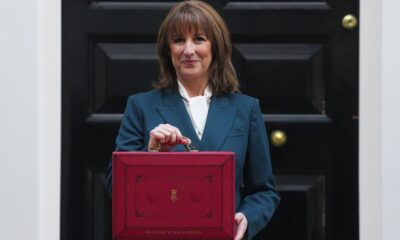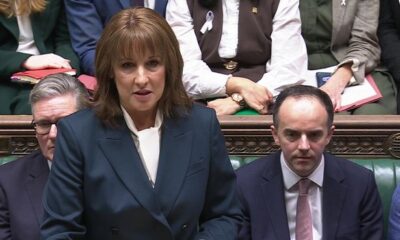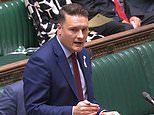Politics
Chancellor Rachel Reeves Unveils Autumn Budget Amid Economic Challenges

The UK government is set to announce its Autumn Budget today at approximately 12:30 PM in the House of Commons. Chancellor Rachel Reeves will address Members of Parliament and outline significant decisions regarding taxes and public service spending, including allocations for the NHS, schools, and police services. This announcement comes after weeks of speculation about the government’s fiscal strategy and its response to ongoing economic challenges.
In a recent statement, Reeves acknowledged widespread public frustration over the economy, particularly concerning the rising cost of living. She is expected to propose further tax increases aimed at balancing the national budget. This comes in light of the Labour Party’s previous promise not to raise income tax, National Insurance, or Value Added Tax (VAT) on working individuals.
In a video address preceding the Budget, Reeves noted improvements over the past year, including “wages rising faster than inflation” and a decrease in hospital waiting lists. Despite this progress, she emphasized the need for continued efforts to address economic inequities.
“I know that the cost of living is still bearing down on family finances,” she stated. “I have to be honest that the damage done from austerity, a chaotic Brexit, and the pandemic was worse than we thought.”
Key Components of the Budget Announcement
The Budget is anticipated to last about an hour, with Kemi Badenoch, the Leader of the Opposition, providing a response immediately afterwards. Following Reeves’s statement, the government will introduce a Finance Bill to implement the proposed policies, which will take legal effect once the bill receives Royal Assent. Typically, changes take effect in the following tax year starting in April, although some adjustments, such as those affecting tobacco duties, may occur on the same day as the Budget announcement.
Economic analysts from the Institute for Fiscal Studies (IFS) suggest that Reeves may need to tighten fiscal policies by approximately £22 billion to maintain her economic targets. This tightening is essential to ensure that the government does not borrow for day-to-day spending by the end of this parliament and to reduce government debt relative to national income.
While the Chancellor has expressed a desire to avoid a return to austerity, significant tax increases appear to be a likely outcome.
Potential Tax Changes and Economic Impact
The potential for tax increases has been a topic of considerable debate. The IFS has indicated that Reeves will “almost certainly” need to raise taxes to generate the necessary revenue. Property taxes, in particular, may undergo significant changes. The Labour government has signaled a willingness to reconsider property taxation, potentially replacing stamp duty with a new property tax structure. Additionally, there are rumors of introducing capital gains tax on higher-value homes, despite prior commitments not to impose such taxes on primary residences.
With regard to income tax, National Insurance, and VAT, there remains uncertainty. The Chancellor has previously acknowledged the need to keep taxes on working individuals as low as possible. Yet, recent statements have led to speculation about a potential freeze on income tax thresholds for two more years, which could effectively act as a stealth tax for many families.
The Budget may also address pensions and inheritance taxes. Proposed changes could limit the tax-free cash accessible from pension pots and affect how pension fund contributions are taxed. Furthermore, adjustments to inheritance tax laws could expand the scope of taxable assets, particularly concerning agricultural properties.
As the government grapples with the cost of living crisis, Reeves has hinted at measures such as reducing VAT on energy bills. This strategy aims to alleviate some financial burdens on households facing rising energy costs. Additionally, there are discussions about ending the two-child benefit cap, a change that could potentially lift hundreds of thousands of children out of poverty.
The upcoming Budget represents a crucial moment for the Labour government, which is navigating significant political and economic challenges. Breaking key manifesto commitments on tax increases could undermine public trust. Recent polling indicates that a substantial majority of the UK population views the economy unfavorably, with 79% believing it is in poor condition and 77% disapproving of the government’s economic management.
As the Chancellor prepares to deliver her speech, the implications of her decisions will reverberate throughout the nation, impacting millions of households as they grapple with financial uncertainties. The outcome of this Budget could ultimately define the Labour Party’s economic strategy and political viability in the coming years.
-

 Entertainment3 months ago
Entertainment3 months agoAnn Ming Reflects on ITV’s ‘I Fought the Law’ Drama
-

 Entertainment4 months ago
Entertainment4 months agoKate Garraway Sells £2 Million Home Amid Financial Struggles
-

 Health3 months ago
Health3 months agoKatie Price Faces New Health Concerns After Cancer Symptoms Resurface
-

 Entertainment3 months ago
Entertainment3 months agoCoronation Street’s Carl Webster Faces Trouble with New Affairs
-

 Entertainment3 months ago
Entertainment3 months agoWhere is Tinder Swindler Simon Leviev? Latest Updates Revealed
-

 Entertainment4 months ago
Entertainment4 months agoMarkiplier Addresses AI Controversy During Livestream Response
-

 Science1 month ago
Science1 month agoBrian Cox Addresses Claims of Alien Probe in 3I/ATLAS Discovery
-

 Health4 months ago
Health4 months agoCarol Vorderman Reflects on Health Scare and Family Support
-

 World2 weeks ago
World2 weeks agoBailey Announces Heartbreaking Split from Rebecca After Reunion
-

 Entertainment4 months ago
Entertainment4 months agoKim Cattrall Posts Cryptic Message After HBO’s Sequel Cancellation
-

 Entertainment3 months ago
Entertainment3 months agoOlivia Attwood Opens Up About Fallout with Former Best Friend
-

 Entertainment2 weeks ago
Entertainment2 weeks agoCoronation Street Fans React as Todd Faces Heartbreaking Choice





















